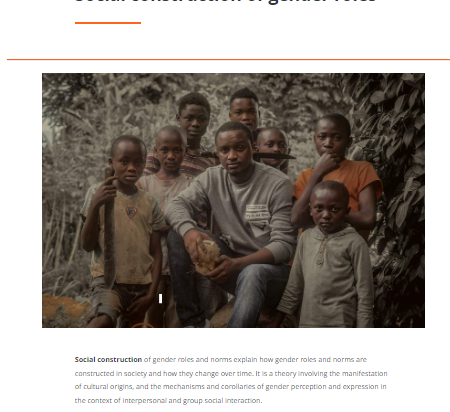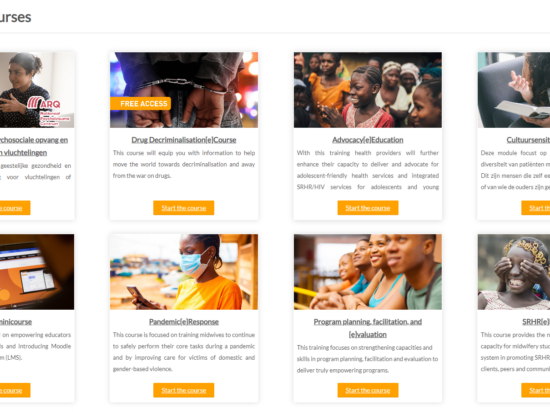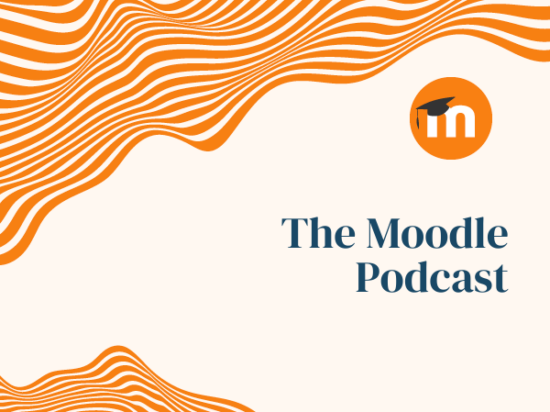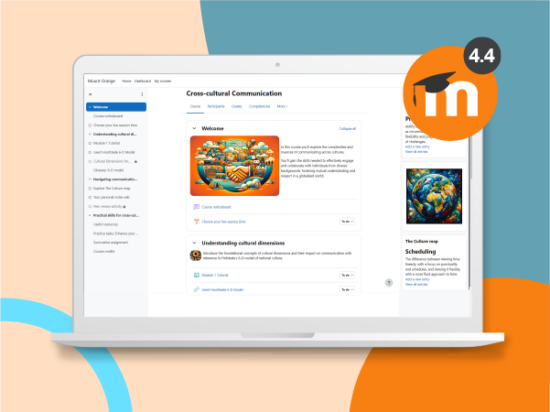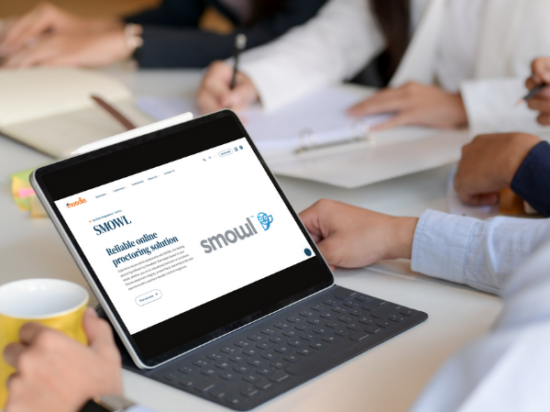Challenge – Equal access to quality healthcare
Health[e]Foundation supports health professionals and community workers in the world’s most vulnerable societies. Using Moodle LMS, Health[e]Foundation is providing digital health education and digital learning services, strengthening healthcare systems and communities globally.
Daphne Elberse, Project Manager at Health[e]Foundation, describes their founding ethos as “Strengthening the knowledge and capacity of health professionals to provide quality care and information to the communities they serve with electronic solutions so that they do not have to leave the clinics unattended.” Since its inception, over 100,000 health professionals, community workers, and community members have benefited from Health[e]Foundations programs in the world’s most vulnerable societies.
With 2000 active learners on their Moodle platform and an alumni cohort of more than 12,000, Health[e]Foundation harnesses the open source power of Moodle LMS to provide digital education and information. Their goal is to provide a straightforward learning journey in three key areas: maternal and child health, community health, and sexual and reproductive health rights.
Health[e]Foundation uses Moodle to support health professionals and community workers globally, with their main activities across Sub-Saharan Africa, such as Ethiopia, Rwanda and Uganda. The organisation had 29 active local partnerships in 2021, providing multiple courses, including a Drug Decriminilisation[e]Course and the SRHR[e]Education program.
Solution – Training midwives with Moodle LMS
A key example of the steps Health[e]Foundation is taking towards health equality is the SRHR[e]Education program, based in Ethiopia. In Ethiopia, health services for adolescents are largely not integrated and are of poor and uneven quality and coverage. An easily accessible source of sexual education for adolescents is needed to make sure they are equipped with the right health information to make informed choices and live healthy lives.
This SRHR[e]Education program trains midwives to fulfil the role of being an accessible source of health information across Ethiopia. The program consists of face-to-face workshops, e-Learning modules through Moodle LMS, and outreach activities.
Health[e]Foundation aims to empower participating midwives to start making an impact already during the program by promoting sexual reproductive health & rights (SRHR) advocacy activities in their communities and strengthening their midwifery skills and knowledge in their daily practice.
Using Moodle LMS, the midwives are provided with nine modules which cover topics such as: “reaching out and engaging with adolescents”; “gender equality and women’s empowerment”; “sexual and gender-based violence”; and “maternal and child health”. Capacity strengthening with communication and facilitation skills, as well as step-by step instructions to carry out each outreach activities are included in the program.
Health[e]Foundation uses Moodle LMS to empower the participants with a highly customised e-Learning journey that is simple, clear and easy to navigate. Through the Moodle App, the program is also fully accessible offline, meaning no one misses out due to issues with internet connectivity or available resources, which can be common in Ethiopia.
For Health[e]Foundation, sustainability is key in the creation of their courses. As Moodle LMS is open source, they can transfer e-Learning programs across to their local partners, meaning that their courses are accessible across countries, such as in Rwanda and Uganda. Health[e]Foundation is also able to create new learning platforms or allocate different roles within the platform, including Teacher and Non-editing Teacher, to share their expertise with others. This makes it simple for others to continue managing the course and make changes without being dependent on the Health[e]Foundation team.
Bety Koždoňová, Digital Learning Expert at Health[e]Foundation said, “It is really important to us to have an open source platform with a big support community. Moodle definitely ticks that box. It is the most widely used LMS in the countries where we work, with around 80% of eLearning in Africa being done on Moodle.”
With strengthened knowledge and skills, future midwives can diversify their services and better support the community members they serve. The program equips midwives in Ethiopia with key information on sexual rights and to identify cases of sexual violence. With this knowledge, they can provide vital care to the community in their time of need.
Result – Care in the community
Between 2020 and 2022, the SRHR[e]Education program has targeted 32 Ethiopian healthcare facilities and successfully trained 391 Ethiopian (future) midwives.
To evaluate the success of the program, Health[e]Foundation reached out to the participants to find out how the course has impacted their professional and personal lives. When surveyed, 96% of learners said they use the knowledge and skills learned in their daily practise, 96% of learners felt they improved their digital literacy skills and 98% appreciated the blended learning approach.
One midwife who completed the program said, “I am impressed with how the world is changing into one village. With e-Learning we can update our knowledge and it is simple and understandable.”
Other courses created by Health[e]Foundation have achieved similarly successful results. The Drug Decriminilisation(e)Course, created in partnership with the International Drug Policy Consortium (IDPC), Mainline Foundation, and Frontline AIDS, provides learners with videos, exercises, and key information to equip them to move the world towards drug decriminalisation.
Between 2021 and 2022, there were 516 learners from 86 countries using the Drug Decriminilisation[e]Course which is made up of six interactive and engaging modules. It is available in English, French, Russian and Arabic. In a survey conducted during 2021, 95% of the learners said they found the modules relevant to their work, activism or interests, 90% said they were very likely to recommend the course to their colleagues or peers, and the overall course satisfaction rate was 8.9 out of 10.
Health[e]Foundation has also taken full advantage of the Moodle skills they have developed to provide digital learning services for other purpose-driven organisations. They help organisations to convert their learning methods to online or blended training. Health[e]Foundation can advise, develop, and implement digital learning solutions, making the most of the ability to create engaging and modern courses containing media, quizzes and interactivity using Moodle LMS.
To find out more about Health[e]Foundation and the work they are doing towards health equality, visit their website.
![Health[e]Foundation Moodle screenshot Image](https://moodle.com/wp-content/uploads/2022/08/Moodle-screenshot-1-1-550x412.png)
